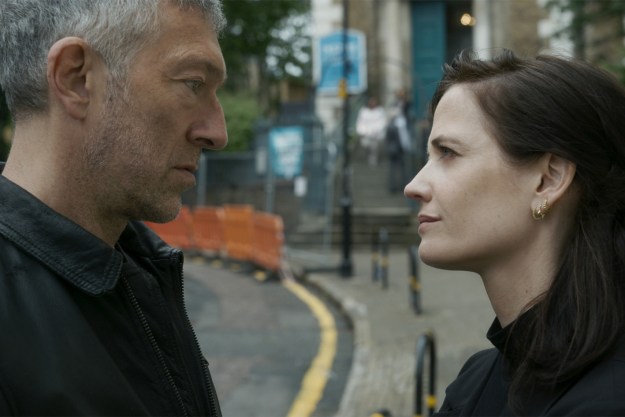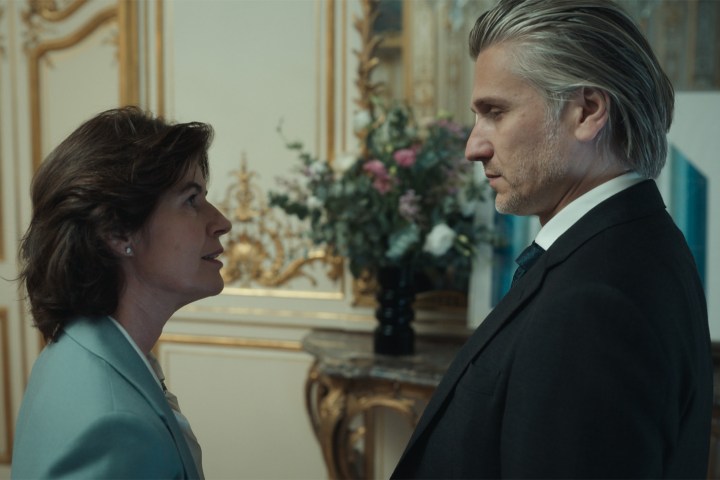
“Eva Green and Vincent Cassel bring their considerable charisma to Liasion, Apple TV+'s flawed but fun new espionage thriller.”
- Vincent Cassel and Eva Green's on-screen chemistry
- Several standout action sequences
- A pitch-perfect final scene
- Several underused, one-note supporting characters
- An overly convoluted plot
- A slow and confusing pair of opening episodes
Liaison is the rare kind of show that’s difficult to get wrong.
The new Apple TV+ limited series is a globe-trotting adventure about a pair of former lovers who find themselves on opposite sides of a global espionage crisis. The series isn’t, in other words, ever in danger of lacking drama, tension, or stakes. Its ingredients are undeniably familiar, and there have been plenty of films and TV shows over the years that have told similar stories in, frankly, far more inventive and charming fashion.
But Liaison also proves that some ingredients, when put together, have a knack for always producing something that is, at the very least, immensely watchable. The series also understands that no romantic espionage adventure is complete without two stars who are not only charismatic and compelling, but whose chemistry makes the danger of their connection seem worthwhile. Fortunately, the stars at the center of the new series are none other than Vincent Cassel and Eva Green, two performers who are well-suited to explore the alluring mix of danger and romance that Liaison has to offer.

Of course, no spy story is complete without a potentially catastrophic security leak. Written by Virginie Brac, Liaison’s first episode efficiently establishes the dangerous hack into Britain’s cybersecurity network that will go on to cause multiple problems throughout the series, as well as the potential solution to the U.K.’s latest batch of problems in the form of two Syrian refugees, Walid (Marco Horanieh) and Samir (Aziz Dyab). In one of Liaison’s opening scenes, Samir and Walid narrowly escape an attack from Syrian and Russian forces and are forced to go on the run.
Over the course of Liaison’s first two episodes, Walid and Samir make their way from Syria all the way to Britain and France. During their journey, the pair repeatedly attempts to set up meetings with powerful intelligence officers within the French and British governments in the hopes that they’ll be able to exchange some key information for new lives in Europe. The duo’s escape coincides with a series of dangerous cyberattacks in England, and it quickly becomes clear that Walid and Samir’s confidential information will not only reveal who is responsible for the attacks, but also what the unidentified terrorists’ full plans are for Britain and the EU at large.
Both the French and British governments predictably take an interest in Walid and Samir and task some of their agents with tracking the two Syrian refugees down. Enter Gabriel Delage (Cassel), a former military intelligence agent turned freelance contractor, and Alison Rowdy (Green), a British government official who shares a complicated past with Cassel’s Gabriel. The two agents quickly come face-to-face for the first time in nearly 20 years and are forced to both work with and against each other in order to try and accomplish their respective missions.

In typical espionage fashion, Liaison’s plot is dense, layered, and full of so many betrayals and underhanded, behind-the-scenes negotiations that it can be difficult at times to keep track of certain characters’ motivations. The show’s first two installments are, consequently, forced to do quite a lot of burdensome heavy lifting. The episodes are full of so many vague conversations, introductions, and twists that they end up feeling far longer and slower than many of Liaison’s later installments.
The series’ opening episodes also make the mistake of keeping Green’s Alison and Cassel’s Gabriel mostly apart from each other, which robs them of the kind of romantic tension and plot progression that viewers likely tuned in to see. That trend comes to an end in Liaison’s third episode, which brings many of the series’ characters together in Brussels and lets them finally begin to exchange information and take on more active roles in the show’s ongoing, global conspiracy. While a subplot involving a vague past betrayal that tore Gabriel and Alison apart never feels like much more than melodramatic filler, Liaison immediately becomes more engaging once Green and Cassel start regularly sharing the screen together.
As Gabriel, Cassel brings a calm confidence that makes the character seem all the more formidable and difficult to read. Opposite him, Green brings a far greater level of emotional vulnerability to Alison. The star makes the most out of her signature, scrutinizing gaze here, using it to great effect in the rare moments when Alison is consumed by either her own yearning for redemption or, even more powerfully, her rage over the various betrayals that have turned her life upside down.

In addition to Cassel and Green, Peter Mullan brings his usual grit and caustic humor to his performance as Richard Banks, Alison’s boss and mentor. Stanislas Merhar also gives a memorably villainous turn as Didier Taraud, a powerful French official who has his own, greedy reasons for wanting to keep Walid and Samir’s information from the British government. Irène Jacob, meanwhile, is reliably confident and commanding, but criminally underused as Taraud’s direct foil within the French government.
Jacob’s limited presence is ultimately a symptom of Liaison’s massive plot, which the series frequently struggles to streamline over the course of its six episodes. Even in the moments when Stephen Hopkins’ largely forgettable direction feels the most visceral and engaging, Liaison often fails to keep its pace up for prolonged stretches of time. There are a few noteworthy exceptions to that rule, including a tense home invasion that opens one episode, as well as an attempted kidnapping in a refugee camp. The sequences in question supercharge two of Liaison’s middle chapters and only help them stand out further from the rest of the show’s less propulsive installments.
While Liaison has a difficult time managing its unwieldy plot, the series never makes the mistake of becoming boring or tedious. Some of its twists are easier to see coming than others, but the show’s use of drone technology and cyber spyware helps give it a refreshingly modern edge, as does its decision to touch on Britain’s complicated relationship with the EU in a post-Brexit world. More than anything, though, Green and Cassel are the reason to tune into Liaison. Even in its uneven finale, the series rarely loses sight of its central relationship, which leads it toward an ending that finds emotional catharsis even within the contradictory shades of chaos and intimacy that are at the heart of all of Liaison’s best moments.
New episodes of Liaison premiere every Friday on Apple TV+. Digital Trends was given early access to all six of the series’ episodes.
Editors' Recommendations
- Don’t let these 3 hidden February streaming TV shows fly under your radar
- Don’t let these 3 hidden January streaming TV shows fly under your radar
- The Diplomat’s ending, explained
- Decision to Leave review: An achingly romantic noir thriller
- Amsterdam review: An exhausting, overlong conspiracy thriller




